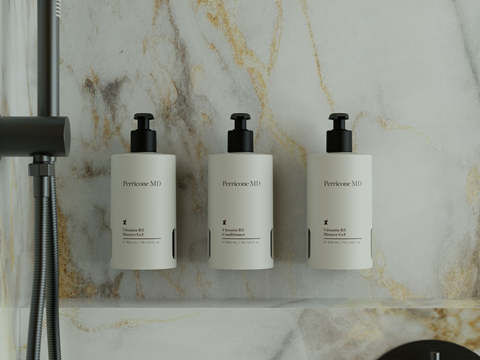
Vanity Group’s refillable bottle for hotel amenities, available in a pouch or inner-bottle replacement system format, aims to cut plastic waste by 93% while improving hygiene and efficiency.
Described as the ‘world’s first’ dual-purpose amenity format, Clean Charge is available in a pouch or an inner-bottle replacement system. Both are said to be completely recyclable at end-of-life and made from recycled materials.
The pouch is believed to contain only 5g of plastic, reportedly making it the ‘lightest’ pouch available on the market, and it claims to reduce more plastic waste than traditional rechargeable options.
Meanwhile, the tamperproof bottle and inner-bottle replacement system are designed to avoid cross-contamination for hygienic refills. The format is designed to mount on a bathroom wall and appear to float, with a discreet window enabling housekeeping to check whether the bottle requires refills.
“Clean Charge is one of my proudest career moments to date,” says Paul Tsalikis, founder and chairman of Vanity Group. “It’s the culmination of 15 years of innovation at VANITY GROUP and marks a paradigm shift in sustainable guest essentials.
“The sleek design and eco-credentials of Clean Charge mean that hotels no longer must compromise. They now have a format that supports them to be ESG leaders and provides a stylish guest experience and operational bliss for the team.
“By switching to Clean Charge, hotels can significantly reduce their carbon footprint. A 150-room hotel for example can achieve up to a 93% saving in plastic paving the way for a more sustainable future for the whole industry.
“I look forward to transforming the hotel experience with our world-leading innovation.”
The format is set to be applied to over 46 brands, including Perricone MD, Origins, and Carner Barcelona. It is also available for La Bottega’s brand portfolio as part of the company’s strategic acquisition of Vanity Group last year.
Similar developments include Molton Brown’s ‘made-to-last’ refillable bottle collection for bath and shower gel products. Since they are made from 100% recycled aluminium (excluding its pump), the bottles are described as infinitely recyclable and are intended to help consumers lower their plastic footprints by 63%.
Refillable personal care brand Wild, which was recently acquired by Unilever, previously joined forces with Morrama to develop a refillable bottle for its liquid cosmetics. The bottle itself is made of aluminium and is designed to encase compostable refills made from 70% bamboo starch and 30% plant starch from agricultural waste. Its plastic pump is said to contain 50% post-consumer recyclate.
We recently reported on L’Oréal Groupe’s packaging progress and found that, despite targeting 100% recyclable, reusable, refillable, or compostable plastic packaging goal by 51%, only 49% of its packaging was said to meet this target in 2024. However, it points to existing offerings like the refill pouches provided for its L’Oréal Paris Elvive hair care line, which aims to reduce plastic consumption by 70%.
If you liked this story, you might also enjoy:
Reuse vs. single use – which is better for the environment?
Sustainable Innovation Report 2025: Current trends and future priorities
What can the world learn from South Korea’s world-leading performance in plastics circularity?














No comments yet